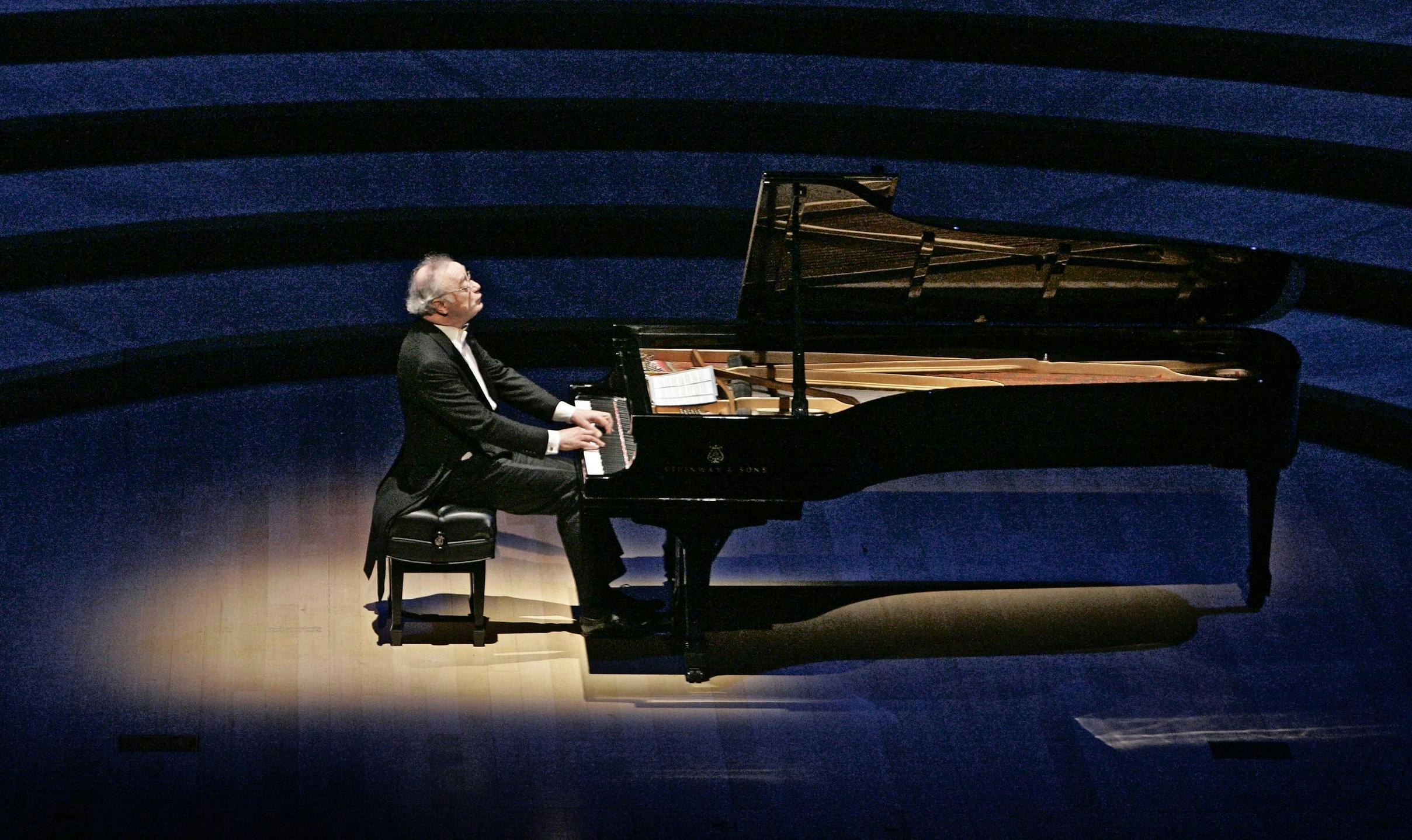This article is taken from the August-September 2025 issue of The Critic. To get the full magazine why not subscribe? Right now we’re offering five issues for just £25.
He worked so hard to appear normal. A tall man, Alfred Brendel cultivated a stoop to meet people at their level. His suits never sat easily on his frame. His tie was dark, no pattern.
His one notable accessory was a pair of black-rimmed glasses of the kind worn by Michael Caine in The Ipcress File. No comparison intended. Where Caine was slick, sexy and laconic, Brendel shambled into a room and spoke in discursive phrases.
The publisher George Weidenfeld urged him to write an autobiography. Brendel declined. “I don’t find myself interesting,” he said. That, for psychoanalysts who lived either side of his Hampstead street, made him more than just interesting. He must be in denial, they said. The most prolific pianist of our time was a book with seven seals, none of them broken.
His childhood shifted around Czech, Croat and Austrian provinces. He would cross Adolf Hitlerplatz to reach his piano teacher in Graz. He never went to music school. In Vienna he was an outsider, his accent not quite right. “I am not rooted,” he once confessed. “I am very happy not to need any sort of soil.”
A shady producer, George de Mendelssohn-Bartholdy, recorded him in Franz Liszt’s Christmas Suite in 1951. This led to Mussorgsky’s Pictures at an Exhibition and Balakirev’s Islamey, splashy Slavonic music on a scratchy American label, Vox-Turnabout.
Eventually he got upgraded to record Mozart concertos with the Vienna Philharmonic, which used the phony name “Pro Musica” to dodge existing contracts. Austria’s all-powerful conductor, Herbert von Karajan, worked with Brendel only once — dismissively, on a Krenek concerto — and refused to have him in Salzburg.
Brendel plugged away at Beethoven on Vox, the 32 sonatas and some fringe variations — “God Save the King”, “Rule, Britannia!” — which he knocked off tongue in cheek. Somehow he managed to appear both deadly serious and not serious at all.

A 1970 Beethoven recital at London’s Queen Elizabeth Hall changed everything. Next morning, three big labels came banging at his hotel door (I saw this happen in olden days, not a pretty sight). Philips won the auction with a plan to record the Viennese masters — Haydn, Mozart, Beethoven and especially Schubert, whose piano works languished behind the rest.
They came up with a strategy that positioned Brendel as the pianist you could trust, the one who put accuracy above ego. In Brendel recordings every note was justified and every dynamic matched the score. He sold out halls to an audience that came to be educated, not entertained.
Brendel called his success “rather grotesque”. Americans were mystified: what’s not to like about success? The New York Times devised new synonyms for “boring”. The intensely pianistic Harold Schonberg found him “diligent, literal and not very imaginative”. Brendel said, “I am responsible to the composer and particularly to the piece.”
Away from the stage he cultivated a quirky wit and a genial sociability. One night over dinner with the Menuhins he castigated me for a frivolous article I had written in the Telegraph, categorising pianists as either eggheads or fruitcakes, intellectuals or nutcases. “You put me down as an egghead,” fumed Alfred, “when I am obviously a fruitcake.” Just another evasion?
Personal image mattered. Philips would wait weeks or months for Brendel to give approval to the latest sheet of cover portraits, which looked exactly the same as all the shots they had published before.
His record sleeves were brown on brown, the colour of mud. You bought a Brendel record because you really wanted it, not because it leapt out at you.
Meticulous in all things, he would test four identical-sounding Steinways all morning before a concert, only to admit afterwards that he had picked the wrong one. Here and there, he might drop a sudden admission of anxiety.
I once pointed to a “difficult” passage in a Brahms concerto. “Don’t ever use that word,” he scolded. “Once I start thinking it is difficult, I can never play the work again.”
Away from the piano stool, he would go to art galleries, theatre, cinema, omnivorous in his cultural appetites and keen to learn about civilisation. He lined his studio with African art. He gave lectures in English on Goethe and wrote a learned essay on the “charming” Dadaists, fruitcakes that they were.
He introduced the exiled Russian poet Joseph Brodsky, his house guest, to the English spy writer John le Carré, a Hampstead neighbour. He walked on the Heath for his health and bought a sticky cake on his way home. Coat tails flapping, Brendel was as familiar a Hampstead character as Keats, Coleridge and George Orwell, yet he remained Austrian to the day he died.
He retired early, in his sixties and with apparent relief. He closed the piano lid for the last time in public a week before Christmas 2008, in Vienna’s Musikvereinsaal where he had played more than a hundred times.
He wanted to write more poems and essays but there were always young musicians begging for a shred of wisdom and there were audiences eager to hear him talk about the mountain of music he had scaled.
It extended from Bach to Alban Berg, a line with few digressions. He despised Tchaikovsky and Rachmaninov, disdained Debussy and Ravel and was only once enticed by Chopin. His summits were the ferocious Arnold Schoenberg concerto, which he recorded four times, and Ferrucio Busoni’s brain-straining Fantasia Contrappuntistica.
A particular empathy was saved for Schumann — the piano concerto and smaller pieces down to Kinderszenen, the scenes from a childhood that he personally refused to revisit. Robert Schumann walked perilously close to the edge that Alfred Brendel so cautiously avoided.












